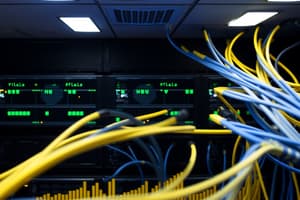Podcast
Questions and Answers
Most wireless routers come configured to provide services immediately upon installation.
Most wireless routers come configured to provide services immediately upon installation.
True (A)
Default usernames and passwords for wireless routers are difficult to find online.
Default usernames and passwords for wireless routers are difficult to find online.
False (B)
Changing the default login credentials of a wireless router is a recommended security practice.
Changing the default login credentials of a wireless router is a recommended security practice.
True (A)
Integrated routers for home use do not typically include DHCP services.
Integrated routers for home use do not typically include DHCP services.
The WAN port on a wireless router is designated for wired clients only.
The WAN port on a wireless router is designated for wired clients only.
Quality of Service (QoS) is a feature that is always included in all wireless routers.
Quality of Service (QoS) is a feature that is always included in all wireless routers.
Cable or DSL modem configurations are usually performed by the router's user.
Cable or DSL modem configurations are usually performed by the router's user.
To access the configuration GUI of a wireless router, one should enter the default IP address in a web browser.
To access the configuration GUI of a wireless router, one should enter the default IP address in a web browser.
By default, newly created WLANs on the WLC use WPA2 with Advanced Encryption System (AES).
By default, newly created WLANs on the WLC use WPA2 with Advanced Encryption System (AES).
The default key management protocol for communicating with the RADIUS server is WPA2.
The default key management protocol for communicating with the RADIUS server is WPA2.
To configure a new WLAN on the WLC, you must create a WLAN and verify its availability.
To configure a new WLAN on the WLC, you must create a WLAN and verify its availability.
The first step in configuring a WPA2 Enterprise WLAN is to enable the WLAN for VLAN 5.
The first step in configuring a WPA2 Enterprise WLAN is to enable the WLAN for VLAN 5.
When configuring a new WLAN, you should always choose an ID of 10.
When configuring a new WLAN, you should always choose an ID of 10.
The WLAN status must be changed to Disabled after creating it.
The WLAN status must be changed to Disabled after creating it.
Configuring WLAN security includes the use of a RADIUS server.
Configuring WLAN security includes the use of a RADIUS server.
The option to choose VLAN for a WLAN is found in the Interface/Interface Group dropdown list.
The option to choose VLAN for a WLAN is found in the Interface/Interface Group dropdown list.
You can create a new WLAN by clicking on the VLANs tab.
You can create a new WLAN by clicking on the VLANs tab.
The new WLAN configuration must always be verified for AES and 802.1X defaults.
The new WLAN configuration must always be verified for AES and 802.1X defaults.
The interface selected for a WLAN must carry WLAN traffic.
The interface selected for a WLAN must carry WLAN traffic.
The Security tab is used to access options for configuring clients.
The Security tab is used to access options for configuring clients.
Verifying the WLAN's operational status can be done through the WLANs menu.
Verifying the WLAN's operational status can be done through the WLANs menu.
The Monitor tab provides user details for the clients connected to the WLAN.
The Monitor tab provides user details for the clients connected to the WLAN.
You can view more information about connected clients by clicking on the Clients menu.
You can view more information about connected clients by clicking on the Clients menu.
To monitor a WLAN, one must access the WLAN configuration settings.
To monitor a WLAN, one must access the WLAN configuration settings.
All the necessary options for securing a WLAN are accessible through the Security tab.
All the necessary options for securing a WLAN are accessible through the Security tab.
One should confirm that there are no clients using a newly configured WLAN.
One should confirm that there are no clients using a newly configured WLAN.
You can configure a WLAN on the WLC using a simulation tool called Packet Tracer.
You can configure a WLAN on the WLC using a simulation tool called Packet Tracer.
All options for monitoring WLAN performance are found under the Clients menu.
All options for monitoring WLAN performance are found under the Clients menu.
Wireless routers typically have a switch for wired clients and support DHCP for addressing.
Wireless routers typically have a switch for wired clients and support DHCP for addressing.
To extend the range of a wireless network, you can add wireless access points which function like routers.
To extend the range of a wireless network, you can add wireless access points which function like routers.
Quality of Service (QoS) settings help prioritize certain types of traffic in wireless networks.
Quality of Service (QoS) settings help prioritize certain types of traffic in wireless networks.
All wireless routers utilize a process called Network Address Tranformation (NAT) for private IP addresses.
All wireless routers utilize a process called Network Address Tranformation (NAT) for private IP addresses.
Lightweight Access Points (LAPs) communicate with a WLAN controller using the Lightweight Access Point Protocol (LWAPP).
Lightweight Access Points (LAPs) communicate with a WLAN controller using the Lightweight Access Point Protocol (LWAPP).
A WPA2 Enterprise WLAN requires a RADIUS server for authentication.
A WPA2 Enterprise WLAN requires a RADIUS server for authentication.
Only wired devices can connect to the WLAN controlled by the WLC.
Only wired devices can connect to the WLAN controlled by the WLC.
SNMP traps can be sent to an external server from the WLAN controller.
SNMP traps can be sent to an external server from the WLAN controller.
RADIUS servers are not necessary for WLANs using WPA2 Personal authentication.
RADIUS servers are not necessary for WLANs using WPA2 Personal authentication.
PC-A must run SNMP and RADIUS server software to manage the WLC.
PC-A must run SNMP and RADIUS server software to manage the WLC.
The WLC does not have the capability to authenticate users.
The WLC does not have the capability to authenticate users.
Users provide their credentials directly to the WLC for verification.
Users provide their credentials directly to the WLC for verification.
Configuration of RADIUS server is included in the scope of WLAN setup training.
Configuration of RADIUS server is included in the scope of WLAN setup training.
WLAN connectivity must be verified after configuration.
WLAN connectivity must be verified after configuration.
Configuring a WLAN on the controller automatically secures the network.
Configuring a WLAN on the controller automatically secures the network.
Flashcards are hidden until you start studying
Study Notes
Wireless Router Overview
- Wireless routers serve remote workers, small branch offices, and home networks, combining a switch for wired clients, internet ports, and wireless components.
- Common features include WLAN security, DHCP services, NAT, and Quality of Service (QoS), with variations depending on the router model.
- Modem configurations for DSL or cable are typically performed by service providers.
Accessing the Wireless Router
- Default IP addresses, usernames, and passwords for wireless routers are readily available online, necessitating changes for security.
- Access the configuration GUI by entering the router's IP address in a web browser. Common default username and password is "admin".
Configuring WPA2 Enterprise WLAN
- Newly created WLANs on the Wireless LAN Controller (WLC) default to WPA2 with AES encryption and use 802.1X for RADIUS server communication.
- Steps to create a new WLAN include:
- Creating a new WLAN
- Configuring WLAN name and SSID
- Enabling WLAN for VLAN 5
- Verifying AES and 802.1X settings
- Configuring WLAN security for RADIUS
- Ensuring availability of the new WLAN
Detailed WLAN Configuration Steps
- Access the WLANs tab to create a new WLAN.
- Enter profile name and SSID, select an ID of 5, and click Apply.
- Change WLAN status to Enabled and associate it with VLAN 5, then click Apply and OK.
- Select the interface to carry WLAN traffic in the configuration.
- Use the Security tab for securing the WLAN.
- Use the WLANs menu to verify WLAN settings and monitor active clients via the Monitor tab.
Packet Tracer Lab
- A practical lab focuses on configuring a WLAN on the WLC, securing it, connecting a wireless host through an AP, and verifying connectivity.
SNMP and RADIUS Configuration
- PC-A operates SNMP and RADIUS, allowing the WLC to send SNMP log messages to the SNMP server.
- RADIUS serves for authentication, authorization, and accounting (AAA) services, requiring username and password verification.
Module Practice and Experience
- In practical activities, objectives include exploring wireless networks, adding Wi-Fi to various settings such as boardrooms and coffee shops, and extending connectivity to dead zones.
Key Takeaways
- Wireless routers combine essential components for both wired and wireless connectivity and are preconfigured for ease of use.
- Changing default login credentials to secure the router is critical.
- QoS can prioritize essential traffic such as voice and video.
- Lightweight Access Points (LAPs) utilize the LWAPP to communicate with the WLC, enhancing network efficiency.
Studying That Suits You
Use AI to generate personalized quizzes and flashcards to suit your learning preferences.



